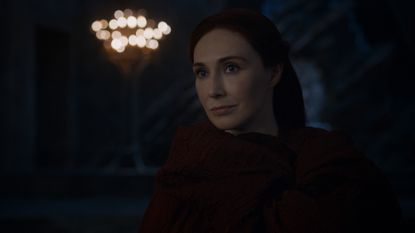Game of Thrones is finally taking its powerful female characters seriously
This round of female dominance is understated and matter-of-fact rather than empty and triumphalist


Were it not for its final third, "Stormborn" could have been called something cheesy, like "Rise of the Queens." Daenerys' war council is manned by female commanders: Olenna Tyrell, Ellaria Sand, and Yara Greyjoy. Queen Cersei presides over the nobles at King's Landing and apparently gets them to fall into line. Sansa is in charge at Winterfell, and Nymeria — in a nicely literal turn — is queen of a formidable pack of wolves.
This is not a purely formal arrangement: It's recreational, too. Missandei initiates sex with Greyworm, Yara and Ellaria are getting it on. This seems like an extension of the hints last week that Times Are Changing. Northern women and girls, Jon announced, will mine for dragonglass and fight alongside their brothers and fathers. What's next? Gender equality? Free love? Is Westeros about to enter its '60s and '70s?
It's a truism that progress provokes a backlash: Enter Euron Greyjoy, a human who considers the fact that he has a penis and two hands instrumental to his project of belittling other men. Euron Greyjoy, that magical charisma-pirate who built the biggest fleet in the world in about a week out of nothing but swagger and sperm.
Subscribe to The Week
Escape your echo chamber. Get the facts behind the news, plus analysis from multiple perspectives.

Sign up for The Week's Free Newsletters
From our morning news briefing to a weekly Good News Newsletter, get the best of The Week delivered directly to your inbox.
From our morning news briefing to a weekly Good News Newsletter, get the best of The Week delivered directly to your inbox.
Euron's influx of absurd hypermasculinity highlights something else about "Stormborn": namely, that this round of female dominance is understated and matter-of-fact rather than empty and triumphalist. That's a welcome departure from the show's previous iterations of Game of Thrones Feminism, which has tended to be far more showy than ethical or substantive. In "Stormborn," the women in charge aren't enthralled with the novelty of their own supremacy; I'd wearied of Daenerys' speechifying. I was less than charmed by that expression she gets when gazing ecstatically at her adoring throngs, which suggests (to put it crudely) that she's buying into her own bulls--t. That's not compelling leadership; real Strong Women (and men) know they're flawed and fallible — see Brienne and the other quiet and pragmatic sites of power in this show.
Game of Thrones has in recent years atoned for its degrading and decorative use of women by offering an astounding array of cheesy Powerful Woman montages. Daenerys' cringingly bad "Mhysa" phase was a bingo card of Problematic Empowerment Tropes that included the white lady saving people of color, the rich lady saving the poor, the pretty lady saving the ugly — all with no follow-through and predictably poor results. Melisandre's Sex-Proud Naked Declamations haven't held up particularly well. Nor have Sansa's instances of triumphant self-creation: Whatever measure of control she gained by dyeing her hair black and donning that black dress collapsed within an episode.
"Stormborn" has none of that pleasurable but empty showboating. Even the Sand Snakes are comparatively subdued (thanks in part to Olenna, who scolded them last season). The tradition of power-as-spectacle has passed to Euron — who shares with Oberyn a penchant for making his physical power a proxy for psychological warfare.
The conversations among the female leaders of Westeros are, by contrast, substantive, strategic, and technical. This, as any person knows, is where real power develops. Take Daenerys' fascinating chat with Melisandre. The Red Woman has been on a downward slide for some time — she's been struggling with her faith, and we know, thanks to the reveal at the end of "The Red Woman," that she's older and more tired than she seems. Whether her self-presentation has changed as a function of that struggle or because she's addressing a female ruler is unclear. Either way, it's noteworthy that when she addresses Daenerys, she spends much less energy on that Sorceress façade. There's none of the pomposity or incantatory rhythm her speech tends to acquire when she's addressing men. No seductive edge. Her information is straightforward. Her affect is matter-of-fact.
Something similar happens with Daenerys, who is oddly unimpressed by Tyrion's vapid reflection — as the storm rages — that she was born on just such a night. When Varys ventures a sweet nothing about how great she is, she grills him on similar professions he's made to other rulers in the past, made while plotting secret defections. She shuts down Tyrion's efforts to defend him.
None of this is usual. Daenerys usually loves being praised. It's as if, having finally returned to her birthplace, Daenerys sees the danger in being hailed and "handled." Maybe returning to your roots does that — anchors you, reminds you of who you are (and aren't). By the end of their terrific little exchange, Varys is speaking frankly for the first time in several seasons. The happy result of this cards-on-the-table alternative to sycophantic nothings is that his information and input will actually be valuable. If "Stormborn" has a theme, it seems to be that while it's fine to have a dramatic back story — like being born in a storm (or surviving a fire) — at some point you should probably wash off the ashes or get out of the rain.
Then there's Arya. Arya has certainly had a flair for theater in the past — she enjoys her "My name is Arya Stark" speech almost as much as Oberyn or Inigo Montoya. But she's gotten smarter and more pragmatic, too. For one thing, she's literally become a better actor (thanks in part to Lady Crane.) She didn't use her name when she killed all the Freys. She just killed them, while doing her best Walder Frey impression. Cersei is efficient too: While the High Sparrow pontificated and made a great show of carving up Loras' forehead, she simply blew up the Sept.
Contrast that with Euron, who killed the Sand Snakes using their own weapons and displayed their remains. You remember who else displayed their dead? Joffrey. Euron had a charming moment, but he's a better foil than he is a character. I'm bored of him already — he magically built a fleet, he magically attacked another. That's not interesting. I'm eager to get back to the strained and difficult chess game Game of Thrones is on the point of becoming — with a board surprisingly saturated with queens.
All that said, this isn't a Great Feminist Uprising in any ethical sense of the term. The moral systems guiding this new clutch of rulers are every bit as vexed and varied as those of the kings they've replaced. It was chilling to hear Lady Olenna's cold appraisal of Margaery's performance as a beloved but ineffective queen; eerie to hear Cersei drum up xenophobic terror of the "heathens" and "eunuchs" Daenerys will bring to King's Landing. But this is exactly the point: We can all cheer for Lady Lyanna Mormont because she's still small and pure. No one on this show really stays that way, and Jaime could have been describing any number of women when he told Randyll Tarly that Olenna is broken and wants revenge. That's true. It's also true of Arya. And of Cersei. Of Olenna, and Ellaria, and Sansa. That's what trauma does.
This is all to say that Game of Thrones' sometimes facile You Go, Girl proto-feminism has developed into something less positive but more interesting. When you make all the big players women, the spectacle of their power isn't enough. They're at war with each other now, and the thing about female empowerment is that it can't be an end unto itself. You might say it intersects — with ethics, with race, with politics, and with the uses and abuse of power. What's the point of being Queen, after all, if all you're Queen of are ashes?
Create an account with the same email registered to your subscription to unlock access.
Sign up for Today's Best Articles in your inbox
A free daily email with the biggest news stories of the day – and the best features from TheWeek.com
Lili Loofbourow is the culture critic at TheWeek.com. She's also a special correspondent for the Los Angeles Review of Books and an editor for Beyond Criticism, a Bloomsbury Academic series dedicated to formally experimental criticism. Her writing has appeared in a variety of venues including The Guardian, Salon, The New York Times Magazine, The New Republic, and Slate.
-
 6 scenic white water rafting destinations to get your heart racing
6 scenic white water rafting destinations to get your heart racingThe Week Recommends Have a rip-roaring time on the water
By Catherine Garcia, The Week US Published
-
 Dangerous substances in Lunchables are raising concerns over children's health
Dangerous substances in Lunchables are raising concerns over children's healthIn the Spotlight High levels of lead and sodium were recently found in the snack packages
By Justin Klawans, The Week US Published
-
 The Week contest: Fired art
The Week contest: Fired artPuzzles and Quizzes
By The Week US Published
-
 Walter Isaacson's 'Elon Musk' can 'scarcely contain its subject'
Walter Isaacson's 'Elon Musk' can 'scarcely contain its subject'The latest biography on the elusive tech mogul is causing a stir among critics
By Theara Coleman Published
-
 Welcome to the new TheWeek.com!
Welcome to the new TheWeek.com!The Explainer Please allow us to reintroduce ourselves
By Jeva Lange Published
-
 The Oscars finale was a heartless disaster
The Oscars finale was a heartless disasterThe Explainer A calculated attempt at emotional manipulation goes very wrong
By Jeva Lange Last updated
-
 Most awkward awards show ever?
Most awkward awards show ever?The Explainer The best, worst, and most shocking moments from a chaotic Golden Globes
By Brendan Morrow Published
-
 The possible silver lining to the Warner Bros. deal
The possible silver lining to the Warner Bros. dealThe Explainer Could what's terrible for theaters be good for creators?
By Jeva Lange Last updated
-
 Jeffrey Wright is the new 'narrator voice'
Jeffrey Wright is the new 'narrator voice'The Explainer Move over, Sam Elliott and Morgan Freeman
By Jeva Lange Published
-
 This week's literary events are the biggest award shows of 2020
This week's literary events are the biggest award shows of 2020feature So long, Oscar. Hello, Booker.
By Jeva Lange Published
-
 What She Dies Tomorrow can teach us about our unshakable obsession with mortality
What She Dies Tomorrow can teach us about our unshakable obsession with mortalityThe Explainer This film isn't about the pandemic. But it can help viewers confront their fears about death.
By Jeva Lange Published